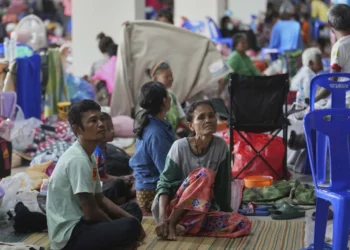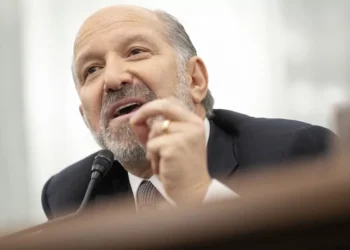Repealing net neutrality regulations would end the internet as we know it. People would die if President Donald Trump’s 2017 tax cuts were passed. From Sen. Bernie Sanders (I-VT) to Rep. Nancy Pelosi (D-CA), Democrats making alarmist, doomsday claims about Republican policies isn’t exactly a new phenomenon. But a Democratic economist just took this ridiculous rhetoric to a new extreme.
During an interview on ABC News, economist and former Obama administration Treasury Secretary Larry Summers bashed the One Big Beautiful Bill Act, in particular, highlighting the reforms to the taxpayer-funded health insurance program Medicaid included in the comprehensive bill. Cue the hysteria.
“The Yale Budget Lab estimates that it will kill, over 10 years, 100,000 people,” Summers said. “That is 2,000 days of death like we’ve seen in Texas this weekend … in my 70 years, I’ve never been as embarrassed for my country on July Fourth.”
That’s right: The Republicans’ modest Medicaid reforms, under which Medicaid spending will still massively increase over the next decade, are supposedly going to “kill” 100,000 people.
How does Summers arrive at this claim? Well, I tracked it back to a Washington Post op-ed in which a Yale lawyer specifically claims that the bill will cause an “uptick in the uninsured population [that] will translate to about 100,000 more avoidable deaths over the next decade.”
What’s the math behind this? Well, the author takes a Congressional Budget Office estimate that 10.8 million people will lose health insurance coverage as a result of the bill’s provision and then extrapolates from that number using studies estimating a reduction in mortality correlated with Medicaid expansion.
But this analysis is wrong on every level and flawed beyond belief.
First, the input number, 10.8 million losing insurance, is almost certainly wrong, and, regardless, using it in this way is misleading. Why? Well, for example, included in this figure are about 1.4 million illegal immigrants to whom states have extended Medicaid benefits. Illegal immigrants are not supposed to receive Medicaid. But the logic of Summers & co. suggests that by removing them from the Medicaid rolls, we are “killing” possibly thousands of them if they develop medical problems and do not receive taxpayer-funded healthcare.
That blame-shifting … can’t be right. Otherwise, America would be murdering hundreds of thousands of people every day by not extending taxpayer-funded health insurance to the entire global population.
In a similar vein, about 1.6 million of the people who will be removed under the CBO’s estimate are people who are ineligible for Medicaid — for example, they may earn too much money — but are currently enrolled. Many of these people will purchase insurance for themselves or receive it through employment after they lose Medicaid coverage. But the logic of Summers & his ilk suggests that the government cannot remove people from Medicaid who are ineligible under federal law for Medicaid without being morally responsible for thousands of murders. Again, that cannot be right, unless you believe that the U.S. government is murdering people every day by not giving every person in the country Medicaid.
You get the idea. Yet the numbers here are also likely inflated. The Congressional Budget Office is a respectable institution that does aspire to do its work in a nonpartisan and rigorous way. But when it comes to projecting insurance coverage changes resulting from shifts in federal policy … their track record is very poor.
According to the Paragon Health Institute, CBO’s past projections about the impact of policy changes on insurance coverage were between “10 and 20 times what actually resulted.” It’s reasonable to expect that their current estimates are similarly inflated, making projections based on them wildly inflated, too.
Yet even if the numbers losing Medicaid coverage are exactly as large as the CBO expects, this analysis still doesn’t hold water. It relies on a faulty, high-end estimate about the reductions in mortality associated with insurance coverage that is not consistent with most research. While insurance is surely a valuable financial tool, as the Paragon Health Institute’s Liam Sigaud explains, “outside of a few vulnerable population subgroups (e.g., children), there is little evidence that insurance significantly improves the health of most people.” Meanwhile, some significant, high-quality research has found no mortality reduction caused by the expansion of health insurance access.
WHY THE KREMLIN HAS DELEGATED ITS TRUMP REBUKES TO PUTIN
So, given that Summers’s analysis relies on a supposed reduction in mortality from insurance that does not appear to exist, the entire alarmist “people will die!” narrative is illegitimate.
The truth is that there is no meaningful reduction in the welfare state that some of these critics would ever accept. And the sad fact that so many people believe this fearmongering propaganda is a serious obstacle to preserving our financially unsustainable safety net — for the people who actually need it.
Brad Polumbo (@Brad_Polumbo) is an independent journalist and host of the Brad vs Everyone podcast.
















